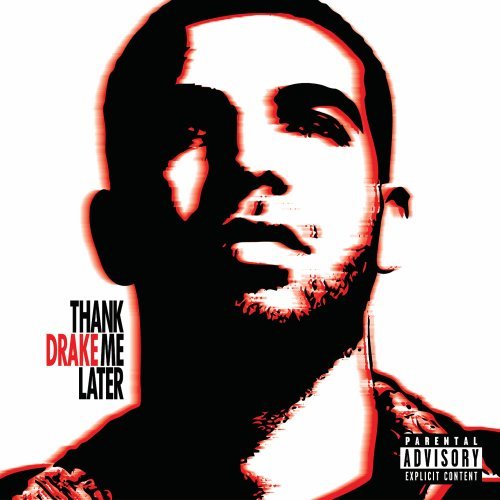
Drake
Thank Me Later
Release Date: Jun 15, 2010
Genre(s): Rap
Record label: Cash Money
Music Critic Score
How the Music Critic Score works
Album Review: Thank Me Later by Drake
Very Good, Based on 9 Critics
Based on rating 8.4/10
Drake sings or raps the word "I" 410 times on his debut album. Even in the realm of hip-hop-- a style famous for its unswerving solipsism-- this is a feat. For comparison's sake, noted mirror watcher Kanye West managed to work only 220 "I"'s into the verses and hooks of his big break, The College Dropout. Illmatic; 210.
Based on rating 8.1/10
It’s difficult to manage expectations when you’ve been called the Next Big Thing in the hip-hop game for a year running. So it goes for actor-turned-rapper Drake with Thank Me Later, the debut studio album from Lil Wayne’s brightest and most visible Young Money protégé. And it’s a problem Drake created for himself, or certainly didn’t try to solve—this is the same guy who once bragged about “buzz so big I could probably sell a blank disc.” As an artist who can sing and rap with equal zeal, he’s been aggressively courting R&B lovers and hip-hop heads with three years’ worth of high-profile mixtape releases.
Based on rating 8/10
The T. I. /Swizz Beatz track “Fancy” is a fun and sassy summer jam with a huge hook, his track with Jay-Z ("Light Up") is a fierce takedown of the Industry and the damage it can wreak, and the Nicki Minaj collabo "Up All Night" is a tough-as-nails boast that features Drake at his most insistent.
Based on rating 7.5/10
You’ve already heard the story, but let’s pause a moment to consider the craziness. A Canadian-born rapper (the best/only since Snow), who until 16 months ago was known for starring in high school soap opera called Degrassi, is releasing this year’s most anticipated album. The hype for this can only be described as nuclear. Eminem, inarguably the biggest pop star of the last 10 years, has an album out next week and a single in the top 10, and I haven’t even heard anyone mention it since it was announced two months ago.
Based on rating B
Fame’s downside is a ?frequent topic for Drake, the Degrassi actor?turned?hip-hop heartthrob, who spends half of his debut Thank Me Later rapping about the anxieties and disappointments that have come with his success. The rest of the time he croons in the seductive monotone that made him so popular in the first place. B Download These:Earnest ballad Find Your Love at myspace.comNicky Minaj collab Up All Night at amazon.com See all of this week’s reviews .
Based on rating 7/10
It is unclear exactly what kind of artist Aubrey Drake Graham wants to be. Groomed by Lil Wayne, taken out partying with big boys like Jay-Z and Diddy, the kid seems to view himself as a member of that company—a hard rapper. But he’s bucking what seem to be his truer colors as a slower, R&B-type singer in the style of Usher or Ne-Yo. On Thank Me Later, easily one of the most anticipated releases of the summer, the identity crisis is in full swing.
Based on rating 3.5/5
The greatest, if not first, indication of the strangely guilt-ridden fixations of Thank Me Later comes on “The Resistance,” in which Drake stutter-steps from remorse over not calling his grandmother in her nursing home to regret over the abortion of his unborn child. It’s this humdrum conflation of the glam-ridden and the everyday, both shaped into conduits for easy self-blame, that define the album, which is bizarrely contrite about almost everything. But it’s Drake’s persistent charm that elevates this material, making it more cross-sectional psyche-plumbing than pitiful whining.
Based on rating 2/5
DRAKE Thank Me Later (Universal) Rating: NN Drake recently said he feels unsafe in Toronto since shooting to fame with last year's staggering So Far Gone mixtape. And after dropping Thank Me Later, he should feel unsafe. I'd punch him in the face, anyway. After a year of anticipating what should've been a game-changer, Drake turns in a merely passable album and comes across as the rap music version of Justin Bieber.
Opinion: Very Good
Debut from Canadian rapper offers remarkable hip hop/RnB hybrid. Paul Lester 2010 Drake is the Vampire Weekend of rap – he ticks all the wrong boxes, especially for a milieu that privileges poverty and strife. He’s a handsome 23-year-old ex-actor from an affluent background who has effortlessly achieved even greater wealth via music that utterly refuses to flaunt its street-tough credentials.

